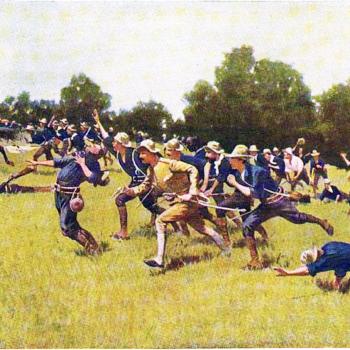My friend Thorn Mooney recently posted a piece about hugging and consent that got a bit of a firestorm going in the comments. I find that I in part concur and in part dissent with my learned colleague.
Now, I’m a fan of boundaries — see the first post on this blog, which was about Terminus, god of boundaries. When I teach self-defense classes I start with the idea that self-defense is a matter of communicating and enforcing boundaries. And as a bodywork therapist and a martial artist I’ve explored giving and receiving touch in some unusual ways. (To say nothing of more intimate explorations of the subject.) I say hooray for every competent adult’s right to set boundaries around touch, and I agree fully with Thorn when she says
“It’s important to remember that, regardless of where you are and what sack of religious labels you’re carrying around, you don’t have the right to anyone else’s body. Personal boundaries…don’t disappear just because a person is naked, in costume, or drunk at the fire circle. They definitely don’t disappear just because a person has been intimate and friendly with other people (or even you in the past). You don’t get automatic access to anyone else’s body[.]”
But the problem comes from a strict application of this idea:
“Ask before you hug. Actually, ask before you touch at all.”
This seems to say that every instance in which one human being touches another must be preceded by explicit verbal consent. I’m not sure if Thorn means it that strictly, but such extreme interpretations of the idea have been proposed as a part of some college’s student behavior codes, part of a misguided attempt to reduce sexual assault. But it’s not an idea that stands up well to scrutiny — either as a means to reduce assault, or as a general rule about touch.
Not every instance of touch is a threat to one’s boundaries. The stranger who bumps against you on the subway has not violated your rights. I do not violate the rights of the man in front of me in line at the bank when I touch him on the shoulder to get his attention and say “Sir, that teller is open.” When a lover puts her arm around me without asking, or her hand on my thigh, or snuggles up against me in bed in a more intimate fashion without a by-your-leave, I have not thereby been assaulted.
It is normal and natural and expected for human beings to touch each other. But that does not negate the right of each competent adult to make decisions about who is allowed to touch them, to set and enforce boundaries and make choices about the situations to which they expose themselves. I can tell my lover “please don’t touch me like that”. I can choose to not ride the subway at rush hour and be pressed up against by strangers. Of course there are costs to these choices. My lover may leave. I might have to radically re-work my schedule.

What we have here is a matter of balance. In any given situation, there is a level of touch which falls within default allowable and expected behavior. But this is in part a cultural determination. When cultures collide there is a mismatch — and this does not mean that anyone is at fault.
I often think of the contrasts between my two grandfathers, products of different ethnic cultures. My father’s father was the son of immigrants and grew up with a lot of Polish culture. (The family name used to be Swieczkowski, before it was Anglicized and then shortened.) My grandfather, my father, my uncle, my brother, and I always had big Slavic bear-hugs for each other, and have never been ashamed to display emotion or shed a tear.
My mother’s father, on the other hand, was descended on his father’s side from English Catholics who’d been in the U.S. for a few generations, and on his mother’s side from German immigrants, and inherited a more restrained approach to showing emotion. After I was twelve or so, he would shake my hand, not hug. I think the only time I saw him cry was after my grandmother died, and even that took several drinks. It’s not that he was cold, indeed he spoiled us grandkids pretty well, but he had a different model for the expression of masculinity.
Now my mom’s dad didn’t push me away when I went to hug him. It took me a while to pick up on it. But was I wrong to take what I had learned from one side of the family and try to apply it on the other? No. And was he wrong to take what he had learned about being a man from his father and try to pass it on to me? No.
So what can we do?
It is a fine and good thing to be aware of the potential for cultural mismatch. Be observant. Consider if your action might be outside someone’s expected norms. When it comes to touch, pay attention to body language — when you put your arms up for a hug, does the other person respond in kind, or do they shrink away, or stand still as if about to endure something unpleasant? Then don’t hug them. And certainly it is not a bad thing to ask.
But on the other hand, be aware that when you go outside of your own default culture you will be in an area of different default assumptions. State your boundaries clearly and firmly but politely. Don’t think evil of someone who make an incorrect but understandable assumption — but don’t stand for a violation of clearly stated boundaries. Someone who puts a hand on your shoulder without asking has not committed a sin…unless you have clearly told them not to do so. (In which case an elbow to the ribs is a perfectly legitimate response, IMHO.)
I’m posting from the Free Spirit Gathering in June! I’l be at Starwood in July.
If you do Facebook, you might choose to join a group on “Zen
Paganism” I’ve set up there. And don’t forget to “like” The
Zen Pagan and Patheos Pagan over there, too.















